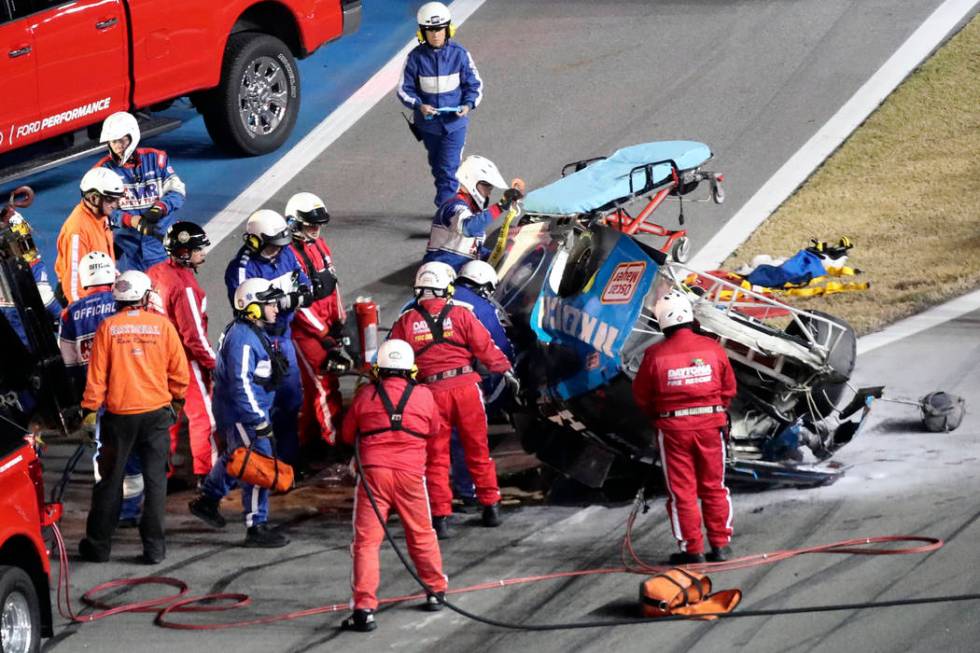Ryan Newman’s crash brings back memories of Dale Earnhardt tragedy

The Crash is still on everybody’s mind.
When 2018 Daytona 500 champion Austin Dillon walked into the media center Friday to chat with reporters, the first question was about his setup for Sunday’s Pennzoil 400 at Las Vegas Motor Speedway.
The second was about Ryan Newman’s devastating crash at Monday’s Daytona 500 — and Newman, incredibly, walking out of Halifax Medical Center in Florida two days later holding hands with his two young daughters.
“We’re going 200 mph around each other, and sometimes force just overtakes what we know is safe,” said Dillon, who walked away from a similar wreck at Daytona in 2015 in which his airborne car ripped out a huge section of the debris fence at the start-finish line.
“Man, it definitely makes you stop and think about it a little bit.”
Newman was racing for the win in NASCAR’s biggest race when his car was tapped from behind, slapped the wall, flipped into the air and careened back onto the track. His disintegrating car was struck broadside by another and caught fire.
The carnage was hideous.
Screens were put up around Newman’s car as track personnel worked to extricate him from what remained of it — usually an indicator of a serious or even fatal injury.
Yet Newman survived the crash, because NASCAR reacted swiftly when Dale Earnhardt perished from his on the same track 19 years ago.
Grim memories rekindled
Despite Newman’s good fortune and pack racing being in their rearview mirror for now, the Cup Series drivers still seemed on edge as they hit the track for practice Friday.
“Man, it’s hard to process it,” defending Pennzoil 400 champion Joey Logano said with a heavy sigh. “Coming to the checkered flag like that, nobody lifts (off the gas) unfortunately. That’s why sometimes you see crashes like that at the superspeedways.”
Newman’s grisly accident brought back grim memories of Earnhardt’s fatal crash on the last lap of the 2001 Daytona 500 that capped a deadly run of races in which Adam Petty and Kenny Irwin were killed in crashes at New Hampshire and Tony Roper in Texas.
After Earnhardt’s death, NASCAR instituted a plethora of safety measures to better protect drivers that included six-point safety harnesses, head and neck restraint systems, softer walls and barriers and body hugging driver seats.
In 2006, the so-called Car of Tomorrow, billed as the safest vehicle ever built for stock car racing, was introduced. A new car that debuts next season should be even more crashworthy.
“I’m glad to see NASCAR already is looking at it, even before this,” Logano said.
NASCAR’s safety record should be lauded. There hasn’t been a fatality in one of its three major touring series in nearly two decades.
But cars continue to get airborne with alarming regularity at Daytona and Talladega, the other high-banked superspeedway on the schedule.
To keep speeds in checks on the big tracks, engines are fitted with spacers that reduce horsepower in much the same manner as the restrictor plates used through last year’s Daytona 500. But with the cars now so evenly matched, they run in huge packs at speeds approaching 2oo mph on the high-banked tracks.
Accidents waiting to happen
It’s thrilling to watch. But even the slightest bump in tight quarters can send a car skittering out of control or, after the laws of physics take over, flying through the air like a rocket ship.
“There are certain fans who enjoy that aspect of it,” said Kyle Busch, who suffered a broken leg after crashing in an Xfinity Series race at Daytona in 2015 before there were SAFER (Steel and Foam Energy Reduction) barriers installed on the inside of the track.
“It’s just a product of what we’ve got. Slowing the cars down would be the start of a good idea. From there I’m not sure what we could do besides taking the banking out and bulldozing the racetracks.”
Older brother Kurt Busch, who walked from a 2013 flip at Talladega, proposed a less expensive alternative to help curb pack racing on the superspeedways.
“If I could throw one recommendation out there — and Goodyear might not be happy about this comment — we need the tires to have more grip on the straightaways,” said Busch, who was a rookie Cup Series driver when Earnhardt was killed at Daytona. “We’re wrecking on the straightaways, not in the corners.
“The cars are safer, yes. But the rules at the same time are bunching us up closer and closer.”
The 2004 NASCAR champion cited a radio transmission from his crew during last week’s race at Daytona when he was charging to the front in the closing laps.
“How many guys are on the lead lap? They said 36. That’s insane,” Busch said. “That’s what is adding to these wrecks — the amount of cars that are still on the lead lap, that are still in contention. It used to be where 500 miles would get you strung out and the cream would rise to the top and you would only have 10 guys that would have a shot at it.”
“Here’s what is going on right now: You have all these (yellow flags for) stage breaks, and all these moments where the pack stays together. And then we get a lot of cars that wreck together.”
Ryan Newman was among the most vocal critics of pack racing on the big tracks.
“They can build safer race cars, they can build safer walls,” he said of the stock car rules makers after Kurt Busch flipped and landed on Newman’s windshield at Talladega. “But they can’t get their heads out of their (expletive) far enough to keep them on the racetrack.”
Contact Ron Kantowski at rkantowski@reviewjournal.com or 702-383-0352. Follow @ronkantowski on Twitter.